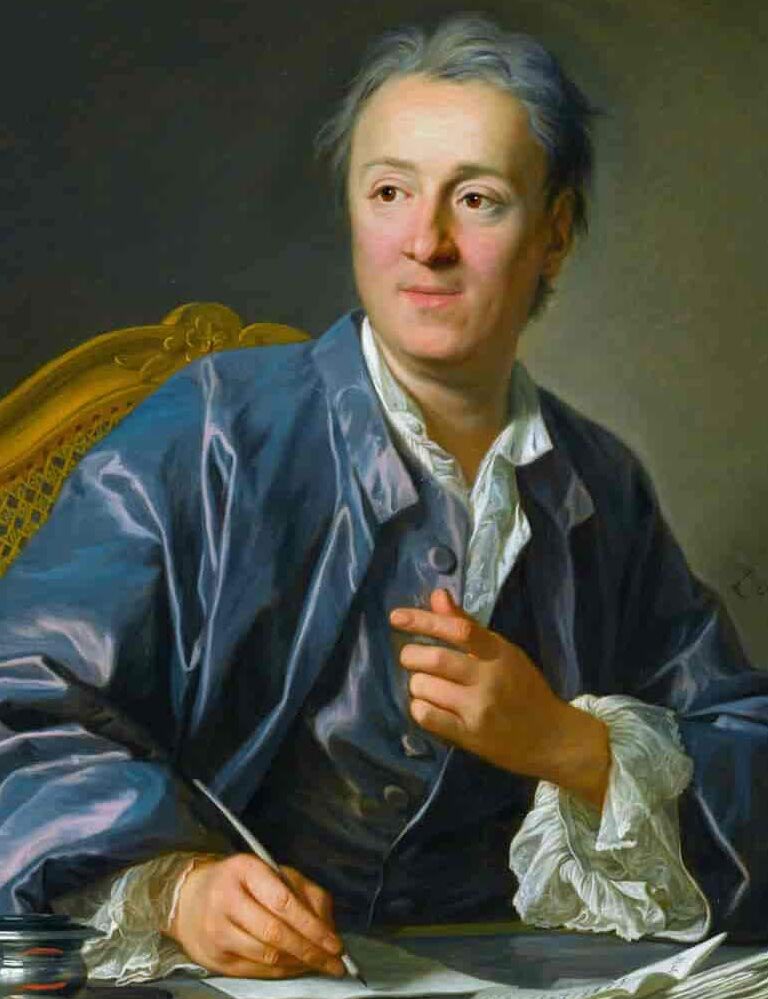Denis Diderot, an eminent figure of the French Enlightenment, left an indelible mark as a philosopher, art critic, and writer. Co-founding and diligently contributing to the renowned Encyclopédie alongside Jean le Rond d’Alembert, Diderot played a pivotal role during the Age of Enlightenment—a period marked by intellectual and cultural growth. Denis Diderot emerges as a complex tapestry of contradictions and brilliance, a figure whose narrative is woven with threads of intellectual rebellion, societal paradoxes, and the timeless allure of a mind that defied conventional categorization. The refusal of Panthéon’s embrace and the metamorphosis from legal studies to literary pursuits are but fragments of a larger tableau that continues to perplex and inspire, ensuring Diderot’s enduring status as a captivating enigma of the French eighteenth century.
Denis Diderot (French Philosopher) Interesting, Fun Facts
By exploring these facets—Diderot’s intellectual endeavors, the commemorative museum, and the dramatic representation in “Le Libertin”—one gains a richer understanding of the man whose ideas illuminated the corridors of knowledge during one of history’s most intellectually vibrant periods.
1. Maison des Lumières Denis Diderot: A Tribute in Stone
The legacy of Denis Diderot is immortalized in the Maison des Lumières Denis Diderot, a museum inaugurated in Langres on October 6, 2013. This institution stands as a homage to Diderot’s profound contributions to the Enlightenment, showcasing his enduring impact on philosophy, literature, and art. The museum serves as a captivating window into the intellectual fervor that defined his era.
2. The Intriguing Narrative of “Le Libertin”
In the theatrical realm, French playwright Eric-Emmanuel Schmitt brings Diderot to life in the drama “Le Libertin.” This captivating production delves into a singular day in Diderot’s existence. The narrative unfolds with a fictitious encounter—a sitting for a woman painter. The atmosphere becomes charged with a sensual intensity, only to be abruptly halted by the weighty responsibilities tethered to the editing of the Encyclopédie. Schmitt masterfully weaves a tale that not only entertains but also offers a glimpse into the complex tapestry of Diderot’s multifaceted life.
20. Diderot: The Enigma of the French Eighteenth Century
Denis Diderot, a luminary of the French Enlightenment, stands as a captivating and enigmatic figure in the annals of the eighteenth century, drawing accolades from scholars such as Otis Fellows and Norman Torrey. His multifaceted persona is marked by intellectual prowess, iconoclasm, and an unrestrained spirit that left an indelible imprint on the intellectual landscape of his era.
21. The Panthéon’s Elusive Embrace
Despite Diderot’s undeniable impact on French thought, his journey beyond mortal realms is marred by a peculiar irony. Repeatedly denied the honor of burial at the Panthéon, the hallowed resting place of distinguished French figures, he remains estranged from the esteemed company of his peers. This denial, a paradoxical twist, underscores the complex and often controversial nature of Diderot’s legacy, leaving his final resting place a subject of perpetual intrigue and debate.
22. A Scholar’s Transmutation into a Wordsmith
Diderot’s foray into the legal realm, albeit brief, unveiled a trajectory that would diverge dramatically from conventional expectations. In the early 1740s, he made a pivotal choice to abandon his legal studies, opting instead to embark on a transformative journey as a writer and translator. This decision marked the genesis of a literary odyssey that would see Diderot become a central figure in the Enlightenment, challenging established norms and reshaping the contours of intellectual discourse in eighteenth-century France.
In a fascinating twist of fate, Diderot’s exploration of the written word not only solidified his place among the literary luminaries of his time but also positioned him as a catalyst for societal change. The vibrancy of his prose and the audacity of his ideas became instrumental in dismantling traditional paradigms, offering a glimpse into the intellectual fervor that characterized the cultural landscape of the French Enlightenment.
More Interesting Articles
- 42 Marilyn Monroe – Bio | Interesting Fun Facts | Contributions
- 10 Life Lessons From Nelson Mandela Motivational Quotes
- 10 Life Lessons from Famous Quotes of Mahatma Gandhi
- 10 Practical Life Lessons from Famous Dr Seuss Quotes
- 29 Anna Lappé Interesting Profile and Biography Facts
- 19 Danielle J Nierenberg – Interesting Profile Biography Facts
- 25 Mary Beth Kelly – Interesting Biography Facts
- 28 Letesenbet Gidey Interesting Profile, Biography Facts
- 26 Louise Gluck Interesting Facts You Didn’t Know
- Muhammed Ali Ansary – M A Ansary Montu Contributions & Facts
- 28 Florence Nightingale Facts – How She Changed the World
- 24 Interesting Facts about Malcolm X – How He Uplifted Himself
- 26 Laura Ingalls Wilder Facts – How She Faced Challenges
- 31 Interesting Facts about Stephen King – Secrets of Success
- 30 Fun Facts about Mother Teresa – What Did She Say Before Died
- 24 Jean Michel Basquiat Facts – Why He Died So Young
- 27 Interesting Facts about Elon Musk – Secrets of Success
- 50 Joe Biden Fun Facts – The 46th US President
- 23 Surprising Catherine the Great Facts – Rise and Fall
- 48 Interesting Facts About Leonardo da Vinci

